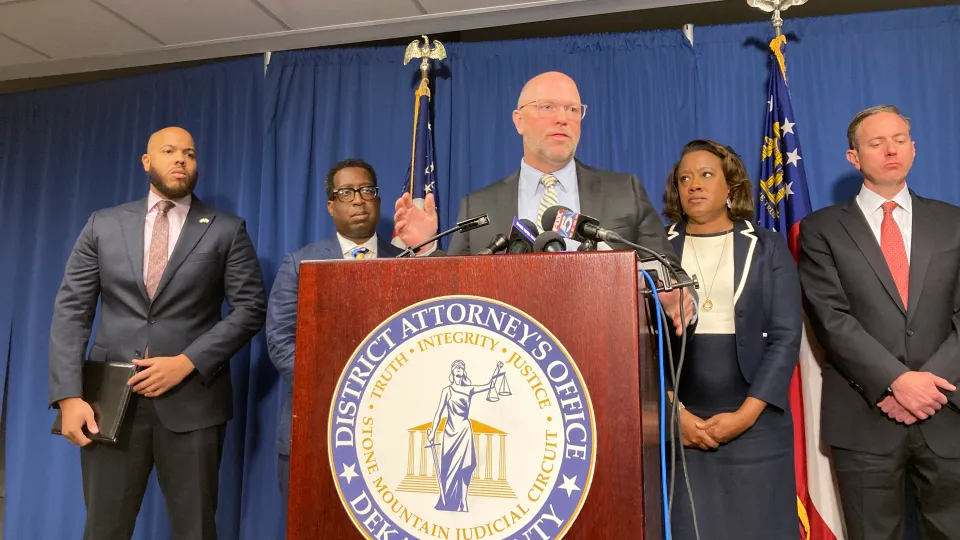A statute establishing a commission to punish and remove state prosecutors in Georgia is being challenged by four district attorneys who claim it is unconstitutional under both the U.S. and Georgia constitutions.

DeKalb County District Attorney Sherry Boston discusses a lawsuit that seeks to strike down a Georgia law restricting prosecutors on August 2, 2023, in Decatur, Ga. Boston and three other Georgia district attorneys filed the suit, saying the law unconstitutionally intrudes on their authority to make decisions about whom to prosecute. (Source: AP News)
Republicans Push the Removal of Georgia Prosecutors
According to the published report from AP News, the lawsuit against Georgia’s Prosecuting Attorneys Qualifications Commission was filed last Wednesday in Fulton County Superior Court in Atlanta. The panel was established earlier this year by a bill that Republicans pushed through. When he signed the bill, Republican Governor Brian Kemp promised that it would rein in “far-left prosecutors” who were “making our communities less safe.”
The primary plaintiff and district attorney in DeKalb County, a heavily Democratic suburb of Atlanta, Sherry Boston, referred to the problem as “bigger than Georgia.” In 2022, Kemp waged anti-crime campaigns similar to those of GOP candidates across the country, charging Democrats with supporting criminals. After some progressive prosecutors filed fewer drug possession charges and requested shorter prison terms, they are pushing back.
According to Carissa Hessick, a law professor at the University of North Carolina and the project’s director, it has been “incredibly convenient” for Republicans to oppose progressive prosecutors. Tennessee, Missouri, Indiana, Pennsylvania, and Florida have all made similar efforts. Hessick added, “I think it was an easy target for people on the right as the progressive prosecution movement acquired national notoriety, especially after there was an upsurge in certain offenses in specific areas.
Fundamental concerns about prosecutorial discretion are brought up by Georgia law. According to the fundamental principle of the American legal system, the prosecutor determines what charges to file and what punishment to pursue. The Republican attorney general of Georgia, Chris Carr, declared he will uphold the legislation. “Unfortunately, some district attorneys have joined the progressive movement around the country to stop upholding the law. Georgia’s communities suffer as a result of such neglect of duty, said Carrissa on the X platform, formerly known as Twitter.
Along with Boston, district attorneys in Augusta and Burke County, Flynn Broady of Cobb County in suburban Atlanta, Jared Williams of Butts, Lamar, and Monroe counties south of Atlanta, and Jonathan Adams of those same counties are also contesting Georgia law. The others are Democrats, while Adams is a Republican. They contend that the law goes too far by requiring district attorneys to consider each case individually. District attorneys contend that they should be permitted to maintain policies that forego the prosecution of entire categories of offenses.
READ ALSO: Missouri Man Who Abducted a 6-Year-Old Girl Two Decades Ago Has Been Executed
Bill Violates the Constitutional Laws
They contend that because the Georgia Constitution includes district attorneys in the judicial arm of the government, the bill is unconstitutional because it violates the division of powers guaranteeing the republic. The requirement to look into minor infractions diverts prosecutors’ attention away from more serious offenses. The lawsuit claims that this obligation is “practically impossible to carry out, restricting district attorneys’ ability to define enforcement priorities and approaches and detracting from the prosecution of meritorious cases.”
The lawsuit claims that district attorneys will be required by state law to consider offenses like adultery, sodomy, and fornication. Adams, for instance, claimed that he withdrew his policy requiring magistrates to deny adultery accusations after the statute went into force on July 1. Even though the state crime lab won’t test marijuana that has been seized in amounts less than one ounce (28 grams), the law may also mandate prosecution for possession of tiny amounts of marijuana.
The plaintiffs contend that the prohibition on written or oral regulations may prevent them from sending criminals to programs that settle matters without resulting in criminal convictions, such as diversion programs. The commission that will supervise prosecutors is not yet in operation. The plaintiffs contend that the rule already violates the right to free speech by preventing prosecutors from sharing their prosecutorial philosophies with voters, therefore it is ready for legal challenge at this point.
Williams claimed that the law “violates the voters’ choice.” We weren’t elected to serve as robots with legal degrees by the public. They selected us to make the difficult choices that in the end safeguard our communities.
In some other states, efforts to rein in prosecutors have run across legal roadblocks. A judge invalidated a Tennessee legislation permitting the state attorney general to become involved in cases involving the death penalty last month. Because Andrew Warren is a Democrat who openly supports transgender rights and abortion, a federal judge in Florida determined that Gov. Ron DeSantis unlawfully singled out Warren. However, the Louisiana Supreme Court ruled that Andrew Warren’s request for reinstatement was made too late.
READ ALSO: Everwood Actor Treat Williams Died in a Collision in Vermont

















































